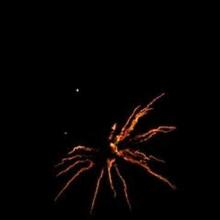The term blown blind is used in a situation where some or all of the stars when e.g. an aerial shell breaks or mine is fired, fail to ignite. The most common causes are inadequate priming or bursting/lifting them too hard.. If a break charge too powerful is used the stars in a shell will move so fast they fail to ignite or the flame blows out. An excessive break charge can also pulverize softer stars causing the fragments to burn up very quickly, or not light at all.
Charcoal type stars are the hardest to blow blind, followed by non-charcoal chlorate stars, then Potassium perchlorate stars. Ammonium perchlorate stars are very easy to blow blind and non charcoal Potassium nitrate stars are the most likely to fail to light or have the flame blown out.
Glitter stars count as charcoal-type stars, and Barium or Strontium nitrate based metallic stars are similar to Potassium perchlorate stars.
Common Reasons for Failure
- Star formula
- Star burst velocity
- Surface hardness of the star
- Chemical variables
- Incorrect ignition of bursting charge by the time fuse
- Shell manufacturing and design variations
- Inadequate prime
Example of blown blind shell:

